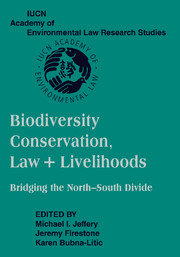 Biodiversity Conservation, Law and Livelihoods: Bridging the North-South Divide
Biodiversity Conservation, Law and Livelihoods: Bridging the North-South Divide Published online by Cambridge University Press: 31 July 2009
INTRODUCTION
The biodiversity of the world is a precious gift from God to humans. All living and nonliving constituents of it have been created by Him for our benefits. They are a continuous source of knowledge and immensely valuable, especially in maintaining ecological balance, in fulfilling the food and medicinal needs of humankind, and in generating plentiful financial resources. Such benefits can be sustained for all generations to come only when they are used moderately and in a sustainable way. On the contrary, relentless egotistical and wasteful use of various components of biological diversity and unwarranted transboundary movements of plant and animal species have contributed to virtual ecological destruction, with many plant and animal species having already vanished. If the prevailing activities are not reversed, many more that are at the verge of extinction will go into oblivion in the near future. In addition to the economic and social loss to humanity, depletion of various plant and animal species has caused a long-lasting and in certain areas, irreversible loss to biodiversity and to scientific endeavors based on it. This depletion is also responsible for ecological imbalance.
These problems began to be addressed in 1992 at the United Nations Conference on Environment and Development (UNCED), popularly known as the Rio Conference. The 1992 UN Convention on Biological Diversity (CBD) was signed by a large number of states that had participated at the UNCED, including Malaysia.
To save this book to your Kindle, first ensure [email protected] is added to your Approved Personal Document E-mail List under your Personal Document Settings on the Manage Your Content and Devices page of your Amazon account. Then enter the ‘name’ part of your Kindle email address below. Find out more about saving to your Kindle.
Note you can select to save to either the @free.kindle.com or @kindle.com variations. ‘@free.kindle.com’ emails are free but can only be saved to your device when it is connected to wi-fi. ‘@kindle.com’ emails can be delivered even when you are not connected to wi-fi, but note that service fees apply.
Find out more about the Kindle Personal Document Service.
To save content items to your account, please confirm that you agree to abide by our usage policies. If this is the first time you use this feature, you will be asked to authorise Cambridge Core to connect with your account. Find out more about saving content to Dropbox.
To save content items to your account, please confirm that you agree to abide by our usage policies. If this is the first time you use this feature, you will be asked to authorise Cambridge Core to connect with your account. Find out more about saving content to Google Drive.